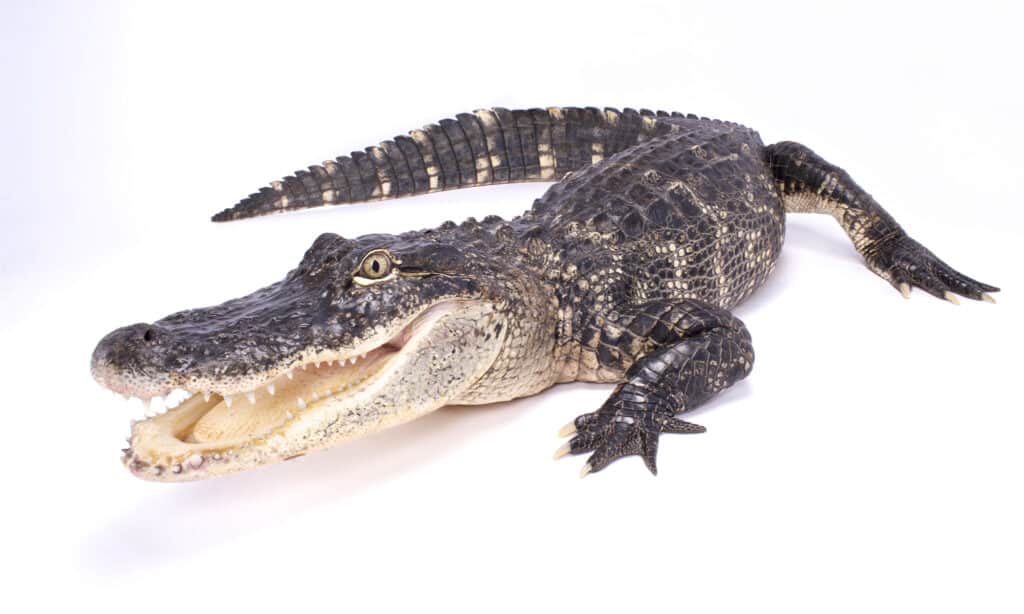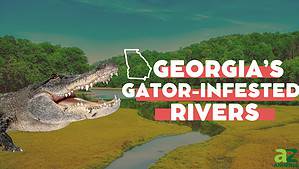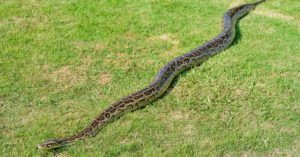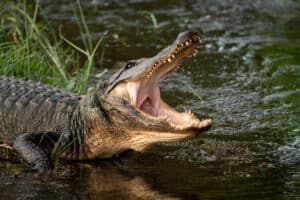The imposing American alligator, armored and formidable with its crushing jaws, has long inhabited the southeastern United States. These stealthy predators evoke fascination and alarm in people across their range. In recent times, alligators have been spreading farther north into new areas, now turning up in counties such as Spartanburg that have not traditionally hosted stable gator populations. This has many residents wondering – is it safe to swim in Spartanburg County?

Alligators have a history of being in Spartanburg.
©reptiles4all/Shutterstock.com
Gator History in Spartanburg
While alligators are found throughout South Carolina, documented populations in Spartanburg County have been small and scattered. Most sightings occurred in the southeastern portion of the county near the Pacolet River. Encounters were rare enough that each new gator spotting made the local news.
Alligator observations and encounters have grown increasingly common in public spaces, bodies of water, and residential areas. Some speculate that milder winters and urban sprawl into wetland habitats have supported the northern expansion. Others believe the gators were always present in small numbers but you can notice them more because of social media and recreational use of waterways.
Whatever the exact cause, Spartanburg residents need to educate themselves about coexisting with these large reptiles.
Gator Safety 101
Although human incidents are uncommon, aggressive encounters with these massive reptiles sometimes occur. Male alligators can reach lengths over 14 feet and weights approaching a staggering one thousand pounds. They are adept ambush predators with lightning-quick bursts over land up to 30 mph.
Fortunately, there are simple tips to stay safe in alligator country:
- Never feed alligators – it causes them to lose their natural fear of humans
- Be especially vigilant near water at night and during mating season in late spring/early summer
- Never allow small children or pets near the water’s edge without close supervision
- Avoid swimming in areas with known alligator populations
- Leave alligators alone if encountered on land -back away slowly to allow them to retreat
- If attacked, fight back vigorously, focusing on the eyes, snout, and legs
- Education and common sense go a long way toward safely coexisting with these ancient creatures.

Following alligator safety tips when swimming in places like Spartanburg County is important.
©SHoener/Shutterstock.com
The Verdict on Swimming in Spartanburg County
The question on many minds is whether it is safe to take a dip and cool off during Spartanburg’s hot, humid summers. While there is no absolute answer, some tips include:
- Stay out of water in places with high alligator populations. These areas pose the highest risk.
- Inspect the banks and shoreline first if swimming in a pond, lake, or river. Leave immediately if an alligator is spotted.
- Follow gator safety tips like avoiding swimming at night or during spring mating season.
- Swimming in clear, chlorinated pools, water parks, and community swim centers is considered low risk for alligator encounters.
- Parents should always closely supervise children in or near any natural water source.
- By being aware of their surroundings and following basic precautions, Spartanburg residents can safely recreate in and around the water they love during alligator mating and nesting seasons. We can continue to appreciate these amazing creatures from a distance with proper education and vigilance.
Living Alongside Alligators
As alligators reside in Spartanburg County, citizens have a choice – allow irrational fear to take hold or arm themselves with facts and adapt. Alligators are ancient creatures, having existed for eons and originating long before modern humans evolved. With understanding and stewardship, there is room for both people and alligators to thrive. Simple precautions can minimize risk on both sides.
In addition, alligators play a vital role in the natural wetland environments they inhabit. As top predators, they regulate prey populations and help maintain the diversity of life we value. Their presence indicates healthy habitat and clean water – something beneficial to human residents.
Coexisting with alligators is a case study of how we can live alongside the wildness that remains, even in suburban areas we have claimed. If we approach them with knowledge, caution, and respect, alligators can continue to inhabit South Carolina waters while posing minimal threat to people. With intelligence and care, we can appreciate our scaly neighbors from a safe distance.
Conclusion
Alligators have become an increasingly common sight in Spartanburg County. While attacks are rare, it pays to be educated about how to recreate safely in their presence. Refrain from swimming in waters where alligators are present, particularly after dark or during mating periods when they are more active. Supervise children near any water source and learn proper gator safety precautions. With smart habits, we can minimize risky encounters while continuing to appreciate seeing these iconic animals in areas where they were historically absent. Alligator resurgence is a sign of ecological health if we embrace it with understanding. With knowledge and vigilance, alligators and humans can safely coexist.
The photo featured at the top of this post is © reptiles4all/Shutterstock.com
Thank you for reading! Have some feedback for us? Contact the AZ Animals editorial team.







